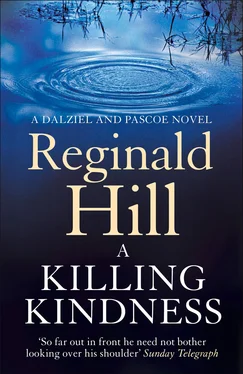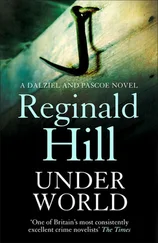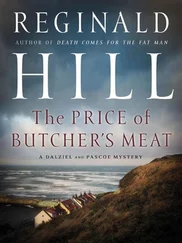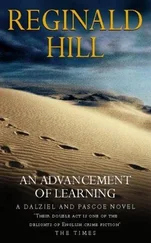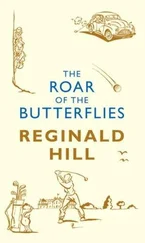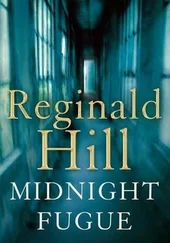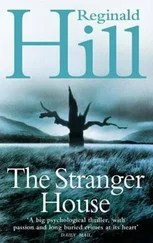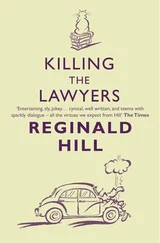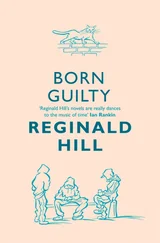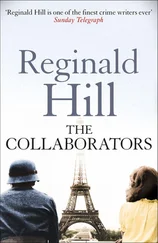‘So what do you want, Mrs Stanhope?’
She opened her youthfully clear brown eyes in big surprise.
‘I want to do what that Evening Post said I was doing already,’ she said. ‘I’ve come to help you with your enquiries.’
When Sergeant Wield reached Charter Park the fairground was doing good business. It was a fine sunny day with just enough breeze to cool a fevered brow and send little puffs of cloud, picturesque to the point of artificiality, drifting across the deep blue cyclorama above. The green of the grass and trees, the sparkling band of the river, the bright brash music of the steam organ, all these combined to produce a pleasantly euphoric sensation in the sergeant’s breast which he allowed to surface in the form of a light almost soundless whistle through gently pursed lips.
His reaction when he reached the fortune-teller’s tent and found the flap closed and a folding chair pushed against it to which was pinned a card saying BACK SOON was disappointment, but it was a purely professional emotion. Pascoe’s winks and nods about Pauline Stanhope’s fancy for him were seeds on the stoniest of ground. Wield’s self-containment and reticence were not linked, as the amateur psychologist might have guessed, to his fearsome appearance. They derived from his early recognition that the best way to conceal one thing was to conceal all things, to have so many secrets that the only important one would not be suspected. And this was that he was wholly and uncompromisingly homosexual. In the police, the usual circular syndrome applied. Homosexuals were disapproved of because they were blackmail risks because they were secretive because they were disapproved of …
Ten years earlier Wield had found himself growing increasingly fond of a man called Maurice Eaton, a Post Office executive who was even more anxious than Wield about the damage an open liaison might do to his career. But they had reached the stage of discussing setting up house together in Yorkshire when Eaton was offered a promotion in the North-East. To Wield, the move had seemed tragic at the time, but soon a routine of weekends in Newcastle and holidays abroad had been established which, while it was not without its tensions and dangers, had proved viable for a decade. But though having the centre of his emotional life a hundred miles away had made him ‘safe’, it also made him a bit of a cypher. Institutions do not like what they do not understand and now he was stuck at sergeant with younger men like Pascoe leapfrogging over his head.
Eventually something would give, he felt it in his bones. Meanwhile, on with the job.
The stall closest to the fortune-telling tent was an old fashioned ‘penny-roll’ at which coins were rolled down grooved ramps to land on a numbered chequer board, winning the amount stated if the coin fell plumb in the middle of a square. The man in charge shrugged indifferently, but his sharp-featured helpmeet believed she had seen Pauline leave about twenty minutes earlier. So BACK SOON could mean an hour or so yet.
He ought to get back to the station. He felt a little guilty at the way he had turned a blind eye to Rosetta Stanhope as he left, but it had seemed amusing to reinforce Pascoe’s impression that he was more concerned with the good-looking niece than the old aunt. But it was very pleasant being out in the sunshine and he found himself asking the penny-roll woman if she knew where he might find Dave Lee.
She gave him a sharp, inquisitive look, then said, ‘He could be on the dodgems, or the waltzer. He helps around when they’re busy.’
‘He doesn’t have anything of his own then? A stall, I mean?’
The woman answered sneeringly, ‘He’s pure didicoi, not real fair people, don’t like regular work, them. There is a stall, a lot of gypsy tat if you ask me. Over there, by the river. You’re a copper, aren’t you?’
‘No, I’m his rich uncle from Australia,’ said Wield gravely.
The dodgems and the waltzer producing no sign of Lee, he made his way to the stall which did nothing to make him feel the penny-roll woman had been unjust. Even in this temple of tawdriness, this looked extra tawdry and the dark-skinned woman with high, aristocratic cheekbones, one of which was livid with a wide bruise, seemed to be making little effort to entice customers.
‘I’m looking for Dave Lee,’ said Wield.
‘What for? Are you going to arrest the bastard?’ she answered.
‘Just talk.’
‘Pity. Why not put him in jail for a while?’
She seemed sincere.
‘Why? What’s he done?’
‘Him? What hasn’t he?’
Suddenly she seemed to tire of the conversation as if even resentment and hatred could not stimulate her interest for long.
‘He’s not here,’ she said flatly.
‘Where might he be?’
She shrugged. Wield consulted his notebook.
‘You don’t have a trailer here, do you? Could he have gone back to the encampment?’
Another shrug. Wield’s patience began to go.
‘All right. Come on.’
‘Come on where?’
‘To the station.’
‘Me? What have I done?’
The interest had been restimulated.
‘You? What haven’t you?’ mimicked Wield.
She swore. He didn’t understand Romany, but he had no doubt what she was calling him.
‘He went in the van,’ she said, gesticulating at the nearby trailer park. ‘Half an hour. To the camp, perhaps. Does he tell me where he goes? If you see him tell him he can …’
‘What?’ asked Wield.
The woman’s face went sullen, flat, once more. Only the bruise gleamed.
‘Nothing,’ she said.
Wield strolled down to the river’s edge. Boats were in large demand and the isthmus was full of people. For two days as a couple of dozen coppers crawled on their hands and knees from one end to the other, it had been closed to the public. The only result had been the most efficient litter-clearing operation in the city’s history. Now the picnickers were back, their appetites doubtless whetted by the thought that on this very spot perhaps a girl had been done to death. And if they got bored with that, they could stroll a hundred yards or so down the canal bank and peer greedily across at the blank wall of Spinks’ Electrical Depository where earlier the same night a watchman had had his skull fractured for the sake of a few cheap transistor radios made in Hong Kong.
Though typically he kept them to himself, Wield had his own carefully worked out ideas about crime and punishment. They included doling out in exactly measured and scientifically monitored doses the kind of pain to the attacker which he had inflicted on the attacked. Nothing to do with barbarities like chopping off hands or cutting off ears. Just the pain.
Though how to measure the pain of terror which these murdered women must have felt, he did not know. But something was needed, something better than we had.
He went back to Madame Rashid’s tent. The notice was still there. He glanced at his watch. One-thirty. The station? Or could he justify going after Dave Lee? It was just a fifteen-minute drive at the most.
‘Sod it,’ he said and headed for his car.
He drove rapidly and efficiently, roughly following the course of the river out of town till he reached the old airfield which lay to the southeast. There had been a time in the affluent days of Super-Mac at the end of the ’fifties when it had teetered on the edge of development into a full-scale airport. But the moment had passed and now it was two-thirds disused, the remaining one-third being in the hands of the local Aero Club. Occasionally small private planes landed, particularly when there was a big race meeting at the city track, but generally speaking only the breathless swoosh of the gliders disturbed the air. There were a couple up now. Wield watched them, admired their soaring freedom but felt no desire to share it. He was a motor-bike man himself. Black leather and 100 mph up the motorway. Something else he kept quiet about at the station.
Читать дальше
